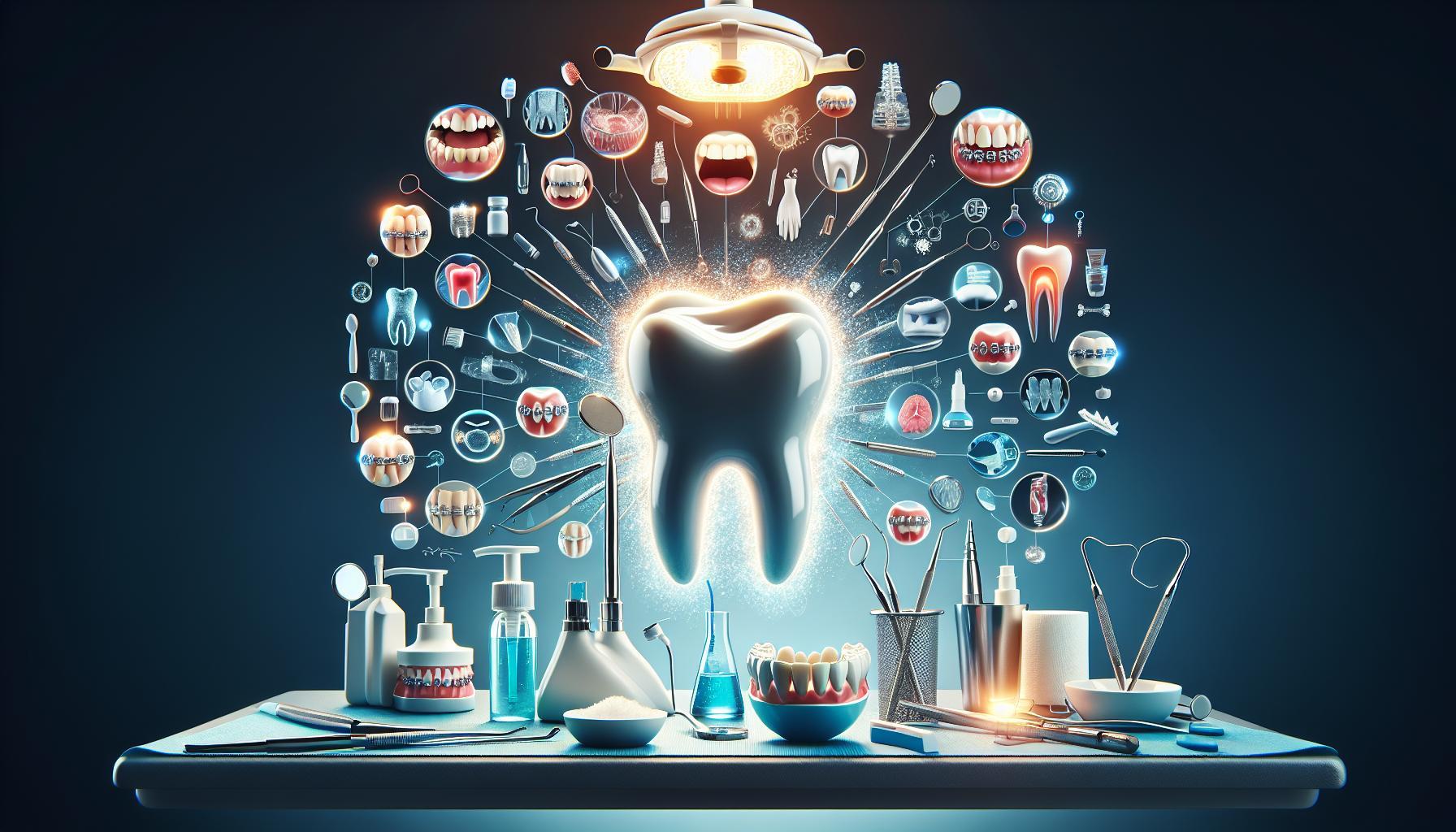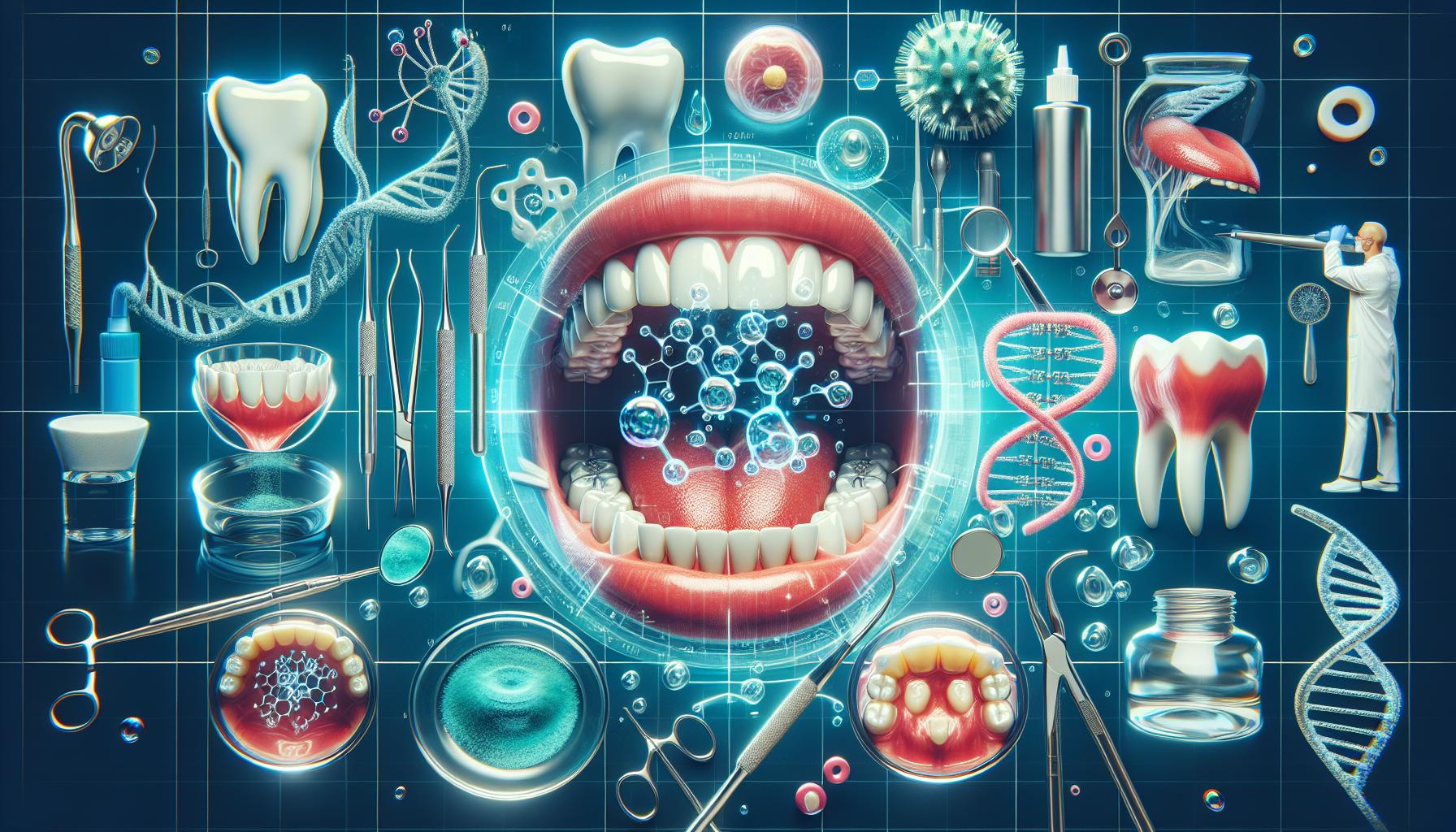
Wondering whether it’s safe to use expired hydrogen peroxide for your oral hygiene routine? It’s a common concern, given that many households keep this versatile product on hand. Understanding the risks and benefits is essential, as expired peroxide may not only be ineffective but could also pose health risks. dive into the details to make informed decisions about your oral care.
markdown
When exploring oral care options,many people turn to hydrogen peroxide due to its well-known antiseptic properties. Though, the question of whether expired peroxide can be safely used arises frequently and merits a careful examination. Even though hydrogen peroxide typically has a shelf life of around three years, its effectiveness diminishes over time. Using expired hydrogen peroxide for oral care could pose risks, such as reduced efficacy in killing bacteria and potential irritation due to byproducts formed after expiration. It’s crucial to understand that while the oxidizing properties of peroxide can assist in whitening teeth and promoting oral health, using an ineffective product can lead to inadequate cleaning and missed opportunities for optimal oral hygiene.
If you’re considering using hydrogen peroxide for oral care, even if it’s just a diluted solution, here are some key points to keep in mind:
- Check the Expiry Date: Always inspect the bottle for the expiry date; expired peroxide may not provide the desired antimicrobial effect.
- Proper Dilution: If using, dilute it to a safe concentration (typically 3% for oral use) to minimize irritation.
- Consult professionals: For personalized advice regarding oral care products, consult a dentist who can provide tailored recommendations.
- Regular Replacement: Regularly replace your hydrogen peroxide to ensure effectiveness and safety.
while hydrogen peroxide can be a beneficial component of oral care, using expired products raises significant concerns that should not be ignored. For optimal results, it is indeed always best to use fresh solutions and adhere to guidelines suggested by dental professionals. By maintaining a proactive approach towards oral hygiene and being informed about the risks and benefits of using expired peroxide,you can make more educated choices about your dental health. For further insights on oral care techniques, consider reading our related articles like “top Tips for Maintaining Healthy teeth” and “Natural Remedies for Oral Hygiene.”
Understanding hydrogen Peroxide: What You Need to Know for oral Care
Did you know that hydrogen peroxide isn’t just a household staple for cleaning and disinfecting? It plays an intriguing role in oral care too. This compound has antibacterial properties, making it a popular choice for mouth rinses. Regular use of hydrogen peroxide-based mouthwash can definitely help reduce bacterial growth, promote gum health, and even assist with basic teeth whitening over time. Though, understanding its request is essential, especially regarding expired peroxide. When considering the question of “Can You Use Expired Peroxide for Oral Care? Risks and Benefits,” the effectiveness and safety of using expired solutions should be carefully evaluated.
When using hydrogen peroxide for oral health, it’s vital to recognise its concentration levels. A mouthwash containing 1.5% to 2% hydrogen peroxide can effectively diminish bacteria and brighten teeth, similar to more concentrated whitening products used under professional supervision [1[1[1[1]. However, using expired hydrogen peroxide can introduce risks. If the peroxide has lost potency, it may not inhibit bacterial growth as intended, thereby diminishing its efficacy in oral care. Moreover, expired solutions could also have altered chemical compositions, perhaps leading to irritation or damage to the soft tissues in the mouth. To maximize the benefits while minimizing risks, consider the following practical steps:
- Always check the expiration date on your hydrogen peroxide before use.
- If expired,dispose of it safely and replace it with a new bottle.
- Consider diluted solutions for routine oral care to mitigate any risks.
by proactively managing the quality of hydrogen peroxide, you can maintain a healthier mouth without compromising your safety. For more insights on optimizing your oral health regimen, check out our related articles on safe mouthwashes and effective teeth whitening options.
The Risks of Using Expired Peroxide in Your Oral Hygiene Routine

Using hydrogen peroxide in your oral hygiene routine can be beneficial for its antibacterial properties, but its effectiveness diminishes significantly after its expiration date. One of the key risks of utilizing expired hydrogen peroxide for oral care lies in its reduced potency. When hydrogen peroxide expires,it breaks down into water and oxygen,thereby losing its ability to effectively kill germs and bacteria that can lead to oral health issues like infections or cavities. Relying on expired peroxide can give you a false sense of security, possibly allowing harmful bacteria to thrive in your mouth without adequate disinfection.
Moreover,using ineffective products can lead to unintended consequences. As a notable example, expired hydrogen peroxide might cause irritation or sensitivity in the oral tissues, notably if utilized in higher concentrations that are no longer stable. This can result in discomfort, and in severe cases, could complicate existing oral conditions. In light of these risks, it is vital to regularly check the expiration date of your hydrogen peroxide before use. If you find yourself with expired peroxide in your dental kit, consider safely disposing of it and replacing it with a fresh bottle to ensure you’re incorporating effective practices in your oral care routine.
| Concern | Details |
|---|---|
| Effectiveness | Expired peroxide loses potency and may not adequately kill bacteria. |
| Safety | Using expired peroxide can cause irritation or adverse effects on oral tissues. |
| Disinfection | Inadequate disinfection can lead to oral infections and cavities. |
To maintain your oral health effectively, it’s advisable to incorporate products that have not surpassed their shelf life and are specifically designed for oral care. Being proactive about your oral hygiene routine not only helps prevent complications but also promotes a healthier mouth overall.for more insights on safe oral hygiene practices, check out our related articles on dental care essentials.
Benefits of Hydrogen Peroxide for Your teeth and Gums
Did you know that hydrogen peroxide, a common household item, can also serve as an effective ally in your oral hygiene routine? Its natural whitening properties make it a popular choice for improving the appearance of teeth while also addressing gum health. When used properly, hydrogen peroxide can help to eliminate bacteria in the mouth, reduce inflammation, and promote healthier gums, making it a multitalented option in dental care. However,it’s crucial to use it with caution and as part of a broader dental care regimen to avoid potential harm to your teeth or gums.
How Hydrogen Peroxide Benefits Your Oral Health
One significant advantage of hydrogen peroxide is its ability to act as a mild antiseptic, which is beneficial for both whitening teeth and treating oral infections. When utilized as a mouth rinse, a dilute solution—typically between 1.5% and 3% concentration—can effectively kill bacteria, helping to reduce the risk of gingivitis and improving overall gum health [[2]]. Additionally, it has been shown that rinsing with hydrogen peroxide can produce whitening effects comparable to some professional treatments, offering a cost-effective option for those looking to brighten their smile without resorting to harsher chemical alternatives <a href="https://www.medicinenet.com/whyisperoxidegoodforyourteethandgums/article.htm”>[[1]].
Moreover, integrating hydrogen peroxide into your oral care routine can promote a more comprehensive approach to dental health. Here are some practical steps to maximize its benefits:
- Use a controlled concentration: Stick to diluted solutions of 1.5%-3% hydrogen peroxide to reduce any risk of damage to soft tissues.
- Combine with regular brushing and flossing: Use hydrogen peroxide after brushing to maximize its antibacterial properties.
- Monitor usage frequency: Limit hydrogen peroxide use to a few times a week to avoid potential irritation or sensitivity.
while hydrogen peroxide can provide various benefits for your teeth and gums, understanding how to use it properly is vital to harness its full potential without experiencing adverse effects. Always consult your dentist before introducing any new element to your oral hygiene regimen, especially when considering the topic of “Can You Use Expired Peroxide for Oral Care? Risks and Benefits,” to ensure it complements your dental health strategy effectively.
Identifying Signs of Expired Peroxide: Don’t Use it If
When it comes to using hydrogen peroxide for oral care, being vigilant about its condition is crucial. Expired hydrogen peroxide is not just less effective; it might also pose risks to your health. One of the moast visible indicators that your peroxide has seen better days is the absence of its characteristic fizzing action when applied to wounds or surfaces. This reaction indicates the release of oxygen,a key part of its disinfecting properties. If you’re not seeing bubbles,it’s a strong sign that the compound has degraded,suggesting you should refrain from using it. Moreover, check the expiration date on the bottle; opened bottles typically last only six months, while unopened ones can remain effective for up to three years [3[3[3[3].
Signs That Indicate Expiration
To help you quickly assess whether your hydrogen peroxide is still usable, consider these practical indicators:
- Change in Color: Fresh hydrogen peroxide is usually clear. If it appears darker or has any discoloration, it might be time to replace it.
- Settling or Separation: If you notice any sediment or separation when inspecting the bottle,this could mean it has expired.
- Container Integrity: Always inspect the bottle’s seal and check for any damage or leaks. A compromised container might indicate that the contents are no longer reliable.
Do not compromise your oral health by using expired products. Always opt for fresh hydrogen peroxide to ensure you reap its full benefits in your oral care routine. for more insights on using hydrogen peroxide safely and effectively, feel free to explore our related articles on oral hygiene and safe home remedies. Remember, proper storage and regular checks on your supplies can help maintain their efficacy.
Safe Alternatives to Expired Peroxide for Maintaining Dental Health
When it comes to maintaining dental health, many individuals often look to household products for solutions. While hydrogen peroxide is commonly used for oral care, using expired peroxide can pose potential risks, such as reduced effectiveness and the introduction of harmful bacteria if the solution is compromised. Instead of relying on expired peroxide, there are several safe alternatives that can effectively support your oral hygiene routine. These options not only promote dental health but also provide peace of mind regarding safety and efficacy.
Effective Alternatives to Hydrogen Peroxide
Here are some reliable alternatives to consider for maintaining your oral health:
- Salt Water Rinse: A mixture of salt in warm water can help in healing oral wounds, reducing inflammation, and maintaining a healthy pH balance in the mouth.
- baking Soda: Known for its natural whitening properties, baking soda can definitely help neutralize acids in the mouth, making it effective against cavities.
- Essential Oils: Oils like tea tree and peppermint have antibacterial properties that can definitely help combat bad breath and promote oral health. Adding a few drops to a carrier oil or water creates a natural mouthwash.
- Activated Charcoal: Although somewhat controversial, activated charcoal is believed to adsorb toxins and is often used for teeth whitening. However,it should be used with caution and not excessively.
For a more in-depth comparison of these alternatives,consider consulting reputable sources that discuss oral care. Exploring options that are both effective and safe can help you maintain a bright, healthy smile without the risks associated with using expired peroxide in your oral care routine. Remember, while these methods can support dental health, they should complement regular brushing, flossing, and professional dental check-ups for optimal results.
Professional dental Advice: When to Consult Your Dentist About Peroxide
When considering the use of hydrogen peroxide for oral care, it’s essential to understand the potential risks involved, particularly when it comes to expired peroxide. Many people might potentially be unaware that using expired products may not only be ineffective but could also compromise oral health due to changes in chemical composition over time. While hydrogen peroxide can be beneficial for teeth whitening and as a disinfectant, consulting a dental professional is crucial if you have any concerns about its use, especially in its expired form. For anyone considering incorporating peroxide into their oral hygiene routine, discussing your particular dental needs with a dentist can definitely help ensure safe and effective use.
It’s advisable to reach out to your dentist if you experience any adverse reactions to using hydrogen peroxide, such as increased tooth sensitivity or irritation of the gums.
- Tooth Sensitivity: If you notice discomfort or pain while using hydrogen peroxide, your dentist may suggest choice whitening options.
- Gum irritation: Should your gums show signs of redness or swelling, this may indicate an adverse reaction that warrants professional evaluation.
- Effectiveness of Storage: Additionally, if you’ve been using peroxide that’s been stored improperly or has passed its expiration date, your dentist can advise whether it’s time to dispose of and replace it with a fresh supply.
your oral health is paramount, and professional guidance can help you navigate the nuances of using hydrogen peroxide safely, preventing potential mishaps associated with using expired products. For further reading on safe practices,consider exploring our related article on the benefits and risks of hydrogen peroxide in dentistry.
Effective Oral Care Tips Beyond Hydrogen Peroxide
When it comes to maintaining oral hygiene, relying solely on hydrogen peroxide might not be sufficient for optimal dental health. While hydrogen peroxide has beneficial properties, including its antibacterial effects and potential for teeth whitening, it’s essential to diversify your oral care routine with othre effective practices. Regular brushing, using fluoride toothpaste, and incorporating interdental cleaning tools can significantly enhance your oral health. Research shows that most dental professionals recommend brushing twice a day for at least two minutes,along with daily flossing,to combat plaque buildup and prevent gum disease.
Alternative Remedies and Practices
Along with standard oral hygiene methods, consider integrating natural remedies that can complement your routine. Here are some effective tips to boost your oral care regimen:
- Oil Pulling: This ancient practice involves swishing coconut or sesame oil in your mouth for 15-20 minutes. It’s believed to reduce oral bacteria and improve overall hygiene.
- Regular Dental Visits: Schedule biannual check-ups with your dentist to catch potential problems early and maintain a professional cleaning routine.
- Balanced Diet: A diet rich in fruits, vegetables, and whole grains not only promotes overall health but also strengthens teeth and gums.
- Stay Hydrated: Drinking plenty of water helps wash away food particles and bacteria, promoting a healthier mouth.
By incorporating these strategies into your oral care routine, you can effectively reduce the reliance on hydrogen peroxide and mitigate any risks associated with its use, especially concerning expired products. The broad spectrum of practices ensures that you maintain a transformed smile while mitigating any potential drawbacks tied to specific treatments, such as the question of *can you use expired peroxide for oral care?* It’s vital to stay informed and prioritize methods that promote long-term dental health. For detailed advice on improving your oral hygiene routine, check out our related articles on the benefits of oil pulling or the importance of regular dental visits.
How to Properly Store Hydrogen peroxide for Maximum Shelf Life
When it comes to maintaining the efficacy of hydrogen peroxide, proper storage is crucial. Did you know that hydrogen peroxide can rapidly decompose when exposed to light,heat,and contaminants? This makes the manner in which you store this versatile substance essential to ensuring its stability and longevity,particularly if you’re considering its use in oral care solutions,as discussed in the article on the risks and benefits of using expired peroxide for oral care.
To maximize the shelf life of your hydrogen peroxide, follow these practical guidelines:
- Keep It Opaque: Always store hydrogen peroxide in its original opaque container. This prevents light exposure, which can degrade the solution’s effectiveness.
- Store in a Cool, Dark Place: Ideal storage conditions include a cool, dark habitat such as a pantry or cabinet.Avoid areas with high temperatures or direct sunlight.
- Seal Tightly: Ensure the container is tightly sealed to prevent contamination and evaporation. A well-purpose bottle stopper can help maintain potency.
- Check Expiration Dates: Pay attention to expiration dates and store only as much as you’ll use in a reasonable timeframe. While some say expired peroxide may still have uses in certain home applications, it’s not recommended for oral care.
Here’s a simple table summarizing the best storage practices:
| Storage Tip | Reason |
|---|---|
| Use an opaque container | Protects from light, which can cause decomposition |
| Store in a cool, dark place | maintains stability and prevents breakdown |
| Seal tightly | Prevents contamination and loss of potency |
| Monitor expiration | ensures effectiveness for safety in use |
By following these guidelines, you can ensure that your hydrogen peroxide remains effective for its intended uses, including any oral care applications explored in the context of its expiration. Always remember that using expired products can come with risks, making proper storage essential for those who advocate for safe practices. for further information on hydrogen peroxide uses and safety, consider reading more about its applications and precautions.
FAQ
Can You Use Expired Hydrogen Peroxide for Oral Care?
What happens if you use expired hydrogen peroxide for oral care?
Using expired hydrogen peroxide can lead to a few potential issues.first and foremost, the main concern is its reduced effectiveness. Hydrogen peroxide can break down over time, losing its potency, which means you might not achieve the expected results in oral care, such as teeth whitening or disinfecting your mouth. For example, a solution that should be effective at 3% may drop to a lower concentration if it’s expired, making it less effective for dental hygiene.
Additionally, there may be safety concerns. Although expired hydrogen peroxide is unlikely to be severely harmful, it’s always best to exercise caution. If you notice any changes in color, smell, or texture, it’s an excellent idea to avoid using it altogether. expired products can sometimes lead to irritation or adverse reactions, especially in sensitive areas like your mouth.
Is it safe to use expired hydrogen peroxide in your mouth?
Generally, it is not recommended to use expired hydrogen peroxide in your mouth. While hydrogen peroxide has antibacterial properties, once it expires, its ability to kill bacteria and whiten teeth diminishes significantly. In some cases, using expired peroxide can lead to mild gastrointestinal distress if ingested, although this is rare.
Moreover, the safety profile of any product decreases significantly after the expiration date. It’s crucial to follow product guidelines and dispose of any expired substances. For maintaining your oral health, it’s advisable to use fresh, properly stored hydrogen peroxide to ensure maximum safety and effectiveness.
How does hydrogen peroxide benefit oral health?
Hydrogen peroxide is often touted for its benefits in oral health, particularly for its antimicrobial properties. It can help in reducing harmful bacteria that cause plaque buildup and gum disease. when diluted properly, it can serve as an effective mouthwash, helping to whiten teeth and freshen breath.Another benefit is its potential to assist in healing minor oral wounds. The bubbling action of hydrogen peroxide when it comes in contact with these wounds helps to clean and disinfect the area. This property is particularly useful for individuals recovering from dental procedures or those with minor cuts in their mouths.
How should you safely use hydrogen peroxide for oral care?
When using hydrogen peroxide for your oral care routine, it’s important to dilute it. A common advice is to use a concentration of 3% hydrogen peroxide, mixed with equal parts water. This dilution minimizes the risk of irritation to your gums and mouth lining, while still providing benefits.
You can use this mixture as a mouth rinse by swishing it around your mouth for about 30 seconds and then spitting it out—never swallow it. It’s advised to do this only a few times a week to avoid excessive irritation.Always consult with your dentist before incorporating hydrogen peroxide into your oral care routine, especially if you have sensitive teeth or gums.
What are the risks of using expired hydrogen peroxide?
Using expired hydrogen peroxide carries risks primarily tied to its effectiveness and safety. The main issue is the decrease in potency, which can lead to inadequate disinfection of the mouth or ineffective whitening of teeth. You may not achieve the results you expect, and more frequent use may lead to frustration or, worse, neglecting proper oral hygiene practices if you’re relying on an ineffective product.
Another risk involves potential irritation or allergic reactions. Although this is uncommon, some individuals may be sensitive to hydrogen peroxide, especially if its concentration is altered due to expiration. Signs of irritation can include sore gums, a burning sensation, or discomfort during oral care. If you experience any of these symptoms, cease use instantly and consult a healthcare professional.
What should you do with expired hydrogen peroxide?
If you find yourself with expired hydrogen peroxide,the best course of action is to dispose of it properly. Most household products, including hydrogen peroxide, can simply be thrown away. However, it’s wise to check local regulations regarding the disposal of household chemicals.
Store unopened bottles in a cool, dark place to extend their shelf life, but always keep track of expiration dates. Rather of relying on expired products, consider purchasing a new bottle when needed. This ensures that you are using the most effective and safe oral care products available, contributing positively to your dental health.
Concluding Remarks
Conclusion: Can You Use Expired Peroxide for Oral Care?
the effectiveness of hydrogen peroxide diminishes significantly after its expiration date.An unopened bottle can last around three years, while an opened container generally expires within six months [[1]]. Using expired peroxide may not pose serious health risks, but its reduced effectiveness can lead to unsatisfactory results in oral care applications, such as whitening teeth or disinfecting the mouth [[3]].
Key Points to Remember:
- Shelf Life: Unopened peroxide lasts about three years; opened, it lasts only six months.
- Effectiveness: Expired peroxide is less effective as a disinfectant and may not achieve desired oral health results.
- Safety: It’s important to avoid using contaminated or expired products.
We encourage you to explore the safe and effective uses of hydrogen peroxide for oral care, alongside other dental hygiene practices.feel free to dive deeper into the topic to ensure you’re making informed decisions about your oral health routine!







